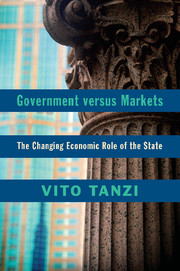Book contents
- Frontmatter
- Contents
- Preface
- PART ONE THE ECONOMIC ROLE OF THE STATE
- PART TWO HISTORICAL REVIEW
- PART THREE THEORETICAL AND ANALYTICAL ISSUES
- PART FOUR THE OUTCOME OF STATE INTERVENTION
- PART FIVE ON THE ECONOMIC ROLE OF THE STATE IN THE FUTURE
- 15 The Economic Role of the State in the Future
- Notes
- Index
- References
15 - The Economic Role of the State in the Future
Concluding Reflections
Published online by Cambridge University Press: 07 October 2011
- Frontmatter
- Contents
- Preface
- PART ONE THE ECONOMIC ROLE OF THE STATE
- PART TWO HISTORICAL REVIEW
- PART THREE THEORETICAL AND ANALYTICAL ISSUES
- PART FOUR THE OUTCOME OF STATE INTERVENTION
- PART FIVE ON THE ECONOMIC ROLE OF THE STATE IN THE FUTURE
- 15 The Economic Role of the State in the Future
- Notes
- Index
- References
Summary
Introduction
What should be, or is likely to be, the economic role of the state in the 21st century? Various factors and different forces are likely to influence that role in the years to come. In the previous chapters that described historical developments from the 19th century on, we reported how countries had managed, some not too badly, with widely different economic roles and different levels of public spending and taxes. Until the 1930s, these levels were very low by modern standards, even though they had been increasing for several decades. For example, in 1930 public spending and taxes were as low as 15 percent of GDP in Sweden and the United States. By comparison, the fiscal deficits in the United States and Great Britain in 2009 and 2010 have been not far from that level. These low tax and spending levels and the government role that they supported must have seemed normal at that time, even though, as reported earlier, some economists, including Keynes, had started calling for more intervention by governments, and the laissez-faire attitude that had prevailed in much of the 19th century was no longer popular. Governments had started to be viewed as potential promoters of social reforms by changed social forces that were acquiring much more political power.
During the second half of the 19th century and much of the 20th century, there was a persistent upward trend, in most advanced countries, in the share of public spending (and tax revenue) in GDP. The increase was justified by expectations that more spending would help satisfy unmet social needs and would increase public welfare.
- Type
- Chapter
- Information
- Government versus MarketsThe Changing Economic Role of the State, pp. 305 - 334Publisher: Cambridge University PressPrint publication year: 2011
References
- 1
- Cited by



